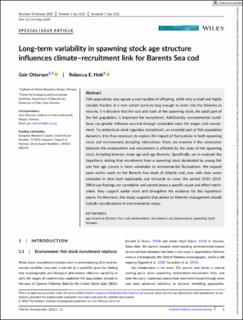Long-term variability in spawning stock age structure influences climate–recruitment link for Barents Sea cod
Peer reviewed, Journal article
Published version
Permanent lenke
https://hdl.handle.net/11250/3029179Utgivelsesdato
2022Metadata
Vis full innførselSamlinger
- Articles [3012]
- Publikasjoner fra CRIStin [3070]
Sammendrag
Fish populations may spawn a vast number of offspring, while only a small and highly variable fraction of a new cohort survives long enough to enter into the fisheries as recruits. It is intuitive that the size and state of the spawning stock, the adult part of the fish population, is important for recruitment. Additionally, environmental conditions can greatly influence survival through vulnerable early life stages until recruitment. To understand what regulates recruitment, an essential part of fish population dynamics, it is thus necessary to explain the impact of fluctuations in both spawning stock and environment, including interactions. Here, we examine if the connection between the environment and recruitment is affected by the state of the spawning stock, including biomass, mean age and age diversity. Specifically, we re-evaluate the hypothesis stating that recruitment from a spawning stock dominated by young fish and few age classes is more vulnerable to environmental fluctuations. We expand upon earlier work on the Barents Sea stock of Atlantic cod, now with data series extended in time both backwards and forwards to cover the period 1922–2019. While our findings are correlative and cannot prove a specific cause and effect mechanism, they support earlier work and strengthen the evidence for the hypothesis above. Furthermore, this study supports that advice to fisheries management should include considerations of environmental status.
